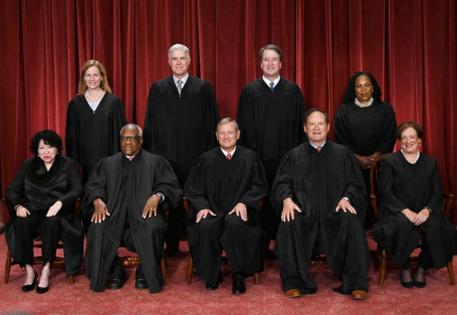Trump's court win opens a path to clear hurdles to his agenda
Published in Political News
WASHINGTON — The U.S. Supreme Court’s ruling curbing the power of judges to block government actions on a nationwide basis has raised questions about whether dozens of orders that have halted President Donald Trump’s policies will stand.
The conservative majority’s ruling Friday came in a fight over Trump’s plan to limit automatic birthright citizenship. But it may have far-reaching consequences for the ability of U.S. courts to issue orders that apply to anyone affected by a policy, not just the parties who filed lawsuits.
Judges entered nationwide preliminary orders halting Trump administration actions in at least four dozen of the 400 lawsuits filed since he took office in January, according to a Bloomberg News analysis. Some were later put on hold on appeal.
Nationwide orders currently in place include blocks on the administration’s revocation of foreign students’ legal status, freezes of domestic spending and foreign aid, funding cuts related to gender-affirming care and legal services for migrant children, and proof-of-citizenship rules for voting.
The Supreme Court’s new precedent doesn’t instantly invalidate injunctions in those cases. But the Justice Department could quickly ask federal judges to revisit the scope of these and other earlier orders in light of the opinion.
“Everything is fair game,” said Dan Huff, a lawyer who served in the White House counsel’s office during Trump’s first term.
A Justice Department spokesperson did not immediately return a request for comment. Trump said at a news conference in the White House Friday that the administration will “promptly file to proceed with numerous policies that have been wrongly enjoined on a nationwide basis.”
Trump listed cases that they would target, including suspending refugee resettlement, freezing unnecessary funding and “stopping federal taxpayers from paying for transgender surgeries.”
The Trump administration has made it a priority to contest court orders that block policies on a nationwide, or universal, basis, although the controversy over whether those types of rulings are an appropriate use of judicial power has been brewing for years. Conservative advocates won such orders when Democratic presidents were in office as well.
Noting the mounting pushback and debate, judges in dozens of other cases involving Trump’s policies have limited their orders against the administration to the parties that sued or within certain geographical boundaries.
Anastasia Boden, a senior attorney at the Pacific Legal Foundation whose practice includes suing the federal government, said she didn’t see the ruling as a total “retreat” from judges’ authority to enter universal orders going forward.
“It’s addressing the case where a plaintiff is getting relief that applies to everyone across the country merely because judges think that it’s an important issue,” she said. “But it doesn’t change the case where the plaintiff needs that relief.”
Boden offered the example of a challenge to government spending, in which the only way to halt an unlawful action would be to stop payment of federal dollars across the country, not just to individual plaintiffs or in certain areas.
Trump’s opponents say the justices’ decision still leaves them with multiple paths to sue the administration over actions they contend are unlawful and even to argue for nationwide relief.
Those options include class action lawsuits, cases seeking to set aside agency actions under a U.S. law known as the Administrative Procedure Act and even continuing to argue that nationwide relief is the only way to stop harm to individual plaintiffs, like parties did in the birthright citizenship cases.
But they also acknowledged the court significantly raised the burden of what they have to prove to win those types of orders.
“This is going to make it more challenging, more complicated, potentially more expensive to seek orders that more broadly stop illegal government action,” Cody Wofsy, deputy director of the ACLU Immigrants’ Rights Project, said. “It is watering down the power of federal courts to check government misconduct.”
The Supreme Court sent the birthright citizenship cases back to lower court judges to reconsider the scope of orders pausing Trump’s restrictions while the legal fight on its constitutionality continues. The justices did not rule on the core question of whether the policy itself is lawful. The administration can’t fully enforce the birthright policy for at least another 30 days.
Democratic state attorneys general involved in the birthright litigation highlighted language in Justice Amy Coney Barrett’s majority opinion that the court didn’t shut off the possibility that the states could still successfully argue for a nationwide order.
Speaking with reporters after the ruling, New Jersey Attorney General Matthew Platkin said that he and his Democratic colleagues would “assess” the effect on other cases. He said they already had been judicious in asking judges for nationwide relief as opposed to orders that restricted administration policies in specific states.
“The court confirmed what we’ve thought all along — nationwide relief should be limited, but it is available to states when appropriate,” Platkin said.
©2025 Bloomberg L.P. Visit bloomberg.com. Distributed by Tribune Content Agency, LLC.

























































Comments